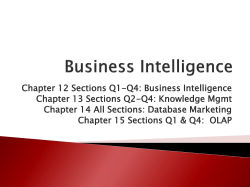
Getting your hands dirty with PSIAs: Going
Getting your hands dirty with PSIAs: Going beyond neat analytical work to the messy business of influencing policy reform Sonya Sultan Senior Social Development Specialist SDV Main IEG PSIA Evaluation Findings • Stated operational objectives: – Informing country policies (71%) – Informing Bank operations (12%) – Building country capacity for policy analysis (14%) • TTL survey reported higher incidence of second and third objectives (relevant to half of PSIAs), and all three being relevant to one-third of the PSIAs • Key findings: – Moderate effect on Bank operations – Modest effect on country policy formulation – Negligible impact in building country capacity for PSIA If you want to influence government policy reform, which most DPOs do …. • Process is just as important as the final product • The process of influencing policies is political and we need to be aware of the politics • Using a range of research methods is important – both quantitative and qualitative tools – to come up with good quality, relevant findings • Use PSIA as a flexible tool/approach, and don’t think of it as simply one type of product How have these issues played out in 2 on-going PSIAs in Ghana and Vietnam? • Can we always address these issues when working with tight deadlines, low capacity governments and limited budget? • What are the trade offs and consequences when not paying attention to some of the issues mentioned above? The case of Ghana: a PSIA for the Natural Resource and Environmental Governance DPO There has been a series of 3 DPOs, with other donors, on the governance issues related to natural resource management since 2008/9. Now next phase (NREG 2) is being designed for another 3 years. Key issues of concern: • Inefficiency and corruption in the management of natural resources and lack of transparency with regards to revenues (EITI issues ….) • Poor people not benefitting from forestry or mining activities as much as expected • Conflict in mining sector PSIA of the mining sector • Stakeholder analysis (first phase of a PSIA) done in 2008/2009. • No follow up till the end of this series of DPO – in 2011 • Now next series of DPO being prepared, and a PSIA on artisanal and small scale mining being organised to review both impact of previous legislation, and ex-ante assessment of new draft Mining Policy The importance of a good process • No follow up after the first stakeholder analysis because it had limited ownership among govt and other local stakeholders (seen as donor requirement) • Certain groups rejected some of the findings as not being valid because not involved early enough in study design and not happy with methodology • Critical issues raised, but then dropped e.g. conflict in mining sector. No quick fixes when difficult issues raised through PSIA – need to follow through. Otherwise reduces credibility of future Bank studies and dialogue attempts. • This time around – more focused PSIA. Important to build interest and ownership among stakeholders. But even now, some tension between what WB team considers important, and what govt would like to study. • The new PSIA TORs includes as much emphasis on “policy dialogue” processes as it does on collecting new data and evidence to inform new policies. It’s a political world out there … • Research is not always seen as objective – many subjective decisions are made about who does it, what methods are used, what questions are asked, who is consulted e.g. perception among CSOs in Ghana that govt and WB are both biased towards private sector. So WB will have to make extra effort from the outset to work with CSOs. • However – key constrain is that staff often do not have time to build the relationships with various stakeholder groups for full ownership of the PSIA, and to understand all the political dynamics – specially when they are based in DC and only fly in for short missions. Don’t leave it to consultants to “do the PSIA”. Engage with the process throughout. • Elements of political economy analysis and institutional analysis has been included in the PSIA analysis because certain issues in the NREG sector can only be explained through such analysis e.g. role of Traditional Authorities in Ghana in managing revenues from mining, or explaining some of the causes and dynamics of conflict in the sector. Using a range of methods • Weakness of 1st stakeholder analysis was that it was seen as too anecdotal (focus group discussions with a range of stakeholders). • Next PSIA is a planning to use a range of tools: – Stakeholder analysis – Institutional analysis and mapping ( building on polt econ analysis that has already been done). – Quantitative data collection on poverty levels for ASM and range of incomes in the value chain – Qualitative analysis of causes of conflict, and patron-client relationships in the informal mining sector Keeping the approach flexible to make it relevant and useful … • Ghana PSIA using both ex-post analysis and exante analysis since it is in-between 2 DPO series • Using the PSIA to develop and test new consultation mechanisms in the sector – since that has been identified as a key problem • Being responsive to demands: PSIA is being linked to other country processes e.g. Cost Benefit analysis of mining sector planed by GoG, Strategic Environmental Assessment, etc… PSIA in Vietnam to support Climate change DPO • Part of a new wave of PSIAs – supporting Climate Change DPOs • The first phase of the PSIA done while the DPO is being developed – so trying to inform DPO design • PSIA focused on changes in water user fees (for irrigation and for personal use); introduction of Participatory Irrigation Management (PIM) systems; displacement of people due to DRM strategies; and assessed use of participatory approaches for development and implementation of DRM and CC plans The process is just as important as the product • Effort made to do the PSIA quickly to inform the DPO series – however trade off is that GoV ownership of the process is now being built after the research has been started • This is being done through a series of workshops for a range of stakeholders to explain what a PSIA is, how it is done, and why it is useful …. Also provision of more detailed training for some GoV officials so that they can be in charge of further PSIAs …. • Important to demystify the PSIA process – it is simply poverty and social analysis, and most govts and countries know how to do this – or get experts to do this – it is often more an issue of lack of political will. The politics of the PSIA • Team was initially reluctant to use an explicit political economy approach since worried that GoV might not react well to it. That is OK – can include PE even if not labeled as such. • Initial PSIA report has highlighted many of the institutional complexities in implementing policy reforms in the water and DRM sectors – overlapping mandates, difference in capacity, and different incentives created for central and local governments because of the flow of funds for Disaster Risk Management • Also need to consider political support and incentives for different proposed reforms e.g. political incentive to keep irrigation fee waver, but it does not create the right incentives for water conservation. This helps DPO team identify what policy reforms can be pushed through DPO, and which are likely to have limited buy-in Using a range of research methods • For the first phase – focused on using existing data and information on CC, and qualitative analysis to help identify the issues that needed further analysis. For e.g., clear that PIM has considerable support and is seen as good for everyone. • Next phase will involve more quantitative analysis to understand how the new rates for water use will affect different groups • Institutional analysis was needed, specially when looking at policies that require cross-sectoral co-ordination. Includes an assessment of who has capacity and incentives to implement pro-poor CC policies Using a flexible approach and thinking of it as a process • In this case, did not make sense to just look at distributional impact of policy – also needed to understand distributional impact of CC, and there was space for that analysis • WB not trying to do all the analysis itself, but wants to create a group of donors, Civil society members and GoV counterparts who will follow up on different part of the PSIA analysis as the DPO moves forward • Started with overview analysis of a number of sectors – next phase will go deeper into particular sectors and specific policy reforms • Some analysis done prior to start of DPO, and some will happen as the DPO is implemented, to keep monitoring whether expected impacts are seen PSIAs and equity • PSIA is not just about measuring whether we are helping deliver equitable outcomes, though that is a key objective • Just as importantly, it can be a tool to make policy formulation and policy dialogue an equitable and inclusive process i.e. more fundamentally democratic, where a wide range of stakeholders, including the poor and vulnerable, are informed about the expected consequences of policy choices, can discuss them and make their concerns known, and hopefully have some influence over the decisions of governments.
© Copyright 2025










